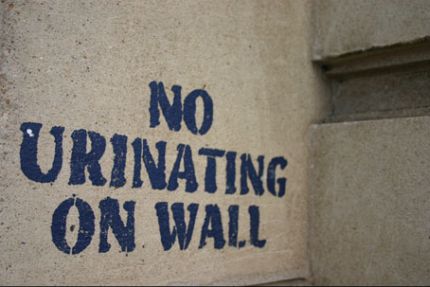
India was one of the first cultures to have sitting toilets in the society. Archaeological remains of the Harappa civilization around the Indus valley, 2500 BC, have disclosed that people of that times had toilets in each house. Those toilets, linked with drains covered with burnt clay bricks, was a fine example of sanitary engineering. Since then, the civilization developed and the sanitation technology declined horribly in the country. At present, 2.6 billion people in the world have no access to toilets and 1.3 billion live in India and China.
People peeing public is a kind of view you can see anywhere across India. This has become a habit for most of the Indians. They hesitate using the public urinal and do prefer peeing in open because of the worst condition of public toilets at most of the places.
Every morning you can find men, children carrying an old tin or bottle of water going towards the nearest train tracks, shoreline, vacant plot, field, or just the side of the road just to relieve themselves. Women usually wait till the late nigh or early morning before they get a chance to go to relieve themselves.
Indian economy is being rated among the three fastest growing economy in the world. The other side of coin reveals that less than 20 % of Indians only have access to good clean toilets across the country. According to the World Health Organization, 80% of India’s diarrhoeal diseases is the result of drinking water contamination by poor sanitation.

The cost of labor has become cheaper than cost of toilet paper in the country. It has resulted in the absence of municipal staffs to keep the public toilets clean.
You would have traumatic experience if you get a chance to visiting public toilet facilities in India most of the times.
Now, World’s 7th World Toilet Summit is going to be held in India this week. Health and sanitation experts representing as many as 40 countries are likely to attend the summit in New Delhi. They would discuss the ways to provide toilet facilities to everyone by 2025. It would work to create awareness among the people that clean, accessible, private toilets are a necessity for living good disease-free life.
People like Bindeshwar Pathak, the founder of Sulabh International, is working hard to build and maintain clean public toilets for the lowest socio-economic groups at very low cost. The Sulabh International NGO has provided hundreds of thousands eco-friendly toilets for public and private use in last 25 years. But, this is not enough and the government will have to work hard to provide clean toilets to people.




